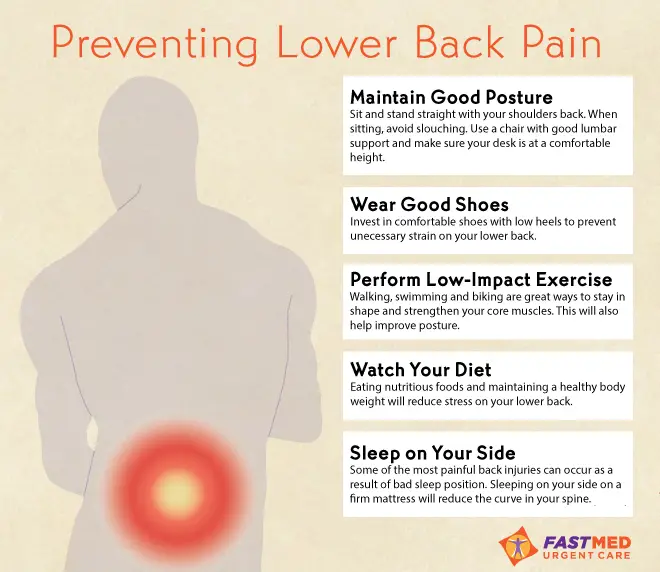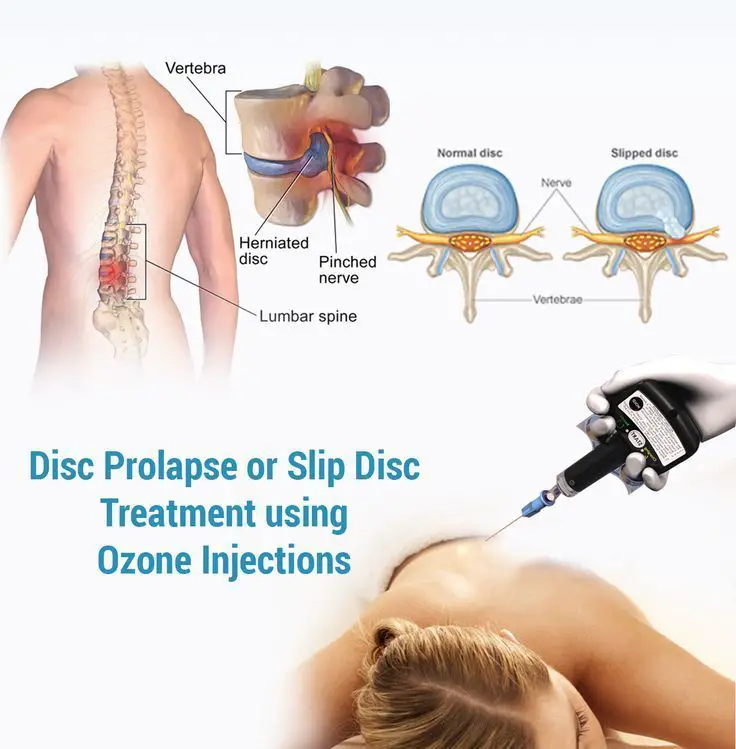Getting Into A Car Accident And/or Falling Down
Getting into a car accident and/or falling down for lower back pain can also be a potential cause of chronic back pain. Car accidents and falls may result in broken bones, cuts, bruises, head injuries, or other serious injuries. Go for an X-ray if you feel uncomfortable.
This injury may not be seen immediately after the accident occurs but may manifest weeks later as chronic back pain is serious.
Solving Your Back Pain Problems
Luckily, there are a few simple fixes for back pain caused by sleep, with only a few minor adjustments to your usual sleeping position. More often than not, people with chronic back pain find that a modified back position is the best for pain-free sleep.
Thats because you can easily support your spine and neck and put even amounts of stress on both sides of your body.
The first step is to use a thin pillow, or even a folded towel, instead of a stack of pillows that over-elevates your head. This reduces strain on your neck. Then, place another pillow under your knees. This eases some of the strain on your lower back.
If you have trouble sleeping on your back, there are other options for avoiding back pain. If you prefer sleeping on your stomach, for example, placing a thin pillow under your hips can reduce pressure on your spine.
Likewise, if you prefer to sleep on your side in the fetal position, putting a pillow between your knees ensures that one side of your hip is not being pulled down.
Recommended Reading: How To Ease Lower Back Pain At Home
How Do I Know If My Upper Back Pain Is Serious
If you have upper and middle back pain without any other symptoms, then probably you will be able to manage your symptoms at home. Over-the-counterpain medications and heat or ice packs may relieve your symptoms. If back pain starts after you make a wrong move lifting or twisting and it then goes away within 72 hours of treatment, there is nothing to worry about. However, if the pain appears immediately or does not go away, it might indicate a severe underlying condition.
Your back pain may indicate a severe underlying medical condition if
- Pain becomes too intense and starts to affect your daily activities.
- You have a fever along with pain.
- Pain that starts immediately after a fall, an accident or a sports injury.
- Pain lingers for more than a few days and requires regular pain medications.
- You have severe pain in the side and back below your ribs.
- You have pain along with numbness or weakness in your arms or legs.
- You have numbness or tingling in your arms, legs, chest or belly.
- Pain radiates to one or both legs, especially, if the pain extends below the knee.
You May Like: Ibuprofen For Back Pain Dosage
Read Also: How Do You Relieve Herniated Disc Pain In The Back
Signs That Your Lower Back Pain Is Serious
Should You See A Doctor If You’re Having Back Pain

Answer: Yes, it’s important to see a doctor if you’re experiencing cauda equina syndrome with pain.
There are many reasons for back pain and treatments differ depending on the causes.
It is important to have your back checked by a professional to determine what the cause of your back pain is and how best to treat it.
Don’t Miss: How To Treat Lower Right Back Pain
Achieve A Healthy Weight
More than 70 percent of people in the U.S. are overweight and nearly 40 percent are considered obese. Carrying extra weight can significantly strain your back muscles and spine.
Losing weight can be difficult however, doing so can help control your back pain, prevent the condition from getting worse, and even potentially eliminate the need for pain medication or surgery. If you need help losing weight, request an appointment.
There are many alternative treatments for back pain, many of which are easy to do at home and affordable, with no doctors prescription necessary.
Carlos Bagley, M.D.
Recommended Reading: Aleve Or Ibuprofen For Back Pain
When Should I Be Concerned About Back Pain
Josefina Lyons | Answered April 28, 2021
Seek emergency medical care
Call 911 or emergency medical help or have someone drive you to the emergency room if your back pain: Occurs after a trauma, such as a car crash, bad fall or sports injury. Causes new bowel or bladder control problems. Occurs with a fever.
Don’t Miss: Why Is My Back So Stiff And Painful
Where Can I Get More Information
For more information on neurological disorders or research programs funded by the National Institute of Neurological Disorders and Stroke, contact the Institutes Brain Resources and Information Network at:
Office of Communications and Public LiaisonNational Institute of Neurological Disorders and StrokeNational Institutes of HealthBethesda, MD 20892
NINDS health-related material is provided for information purposes only and does not necessarily represent endorsement by or an official position of the National Institute of Neurological Disorders and Stroke or any other Federal agency. Advice on the treatment or care of an individual patient should be obtained through consultation with a physician who has examined that patient or is familiar with that patients medical history.
All NINDS-prepared information is in the public domain and may be freely copied. Credit to the NINDS or the NIH is appreciated.
You May Like: Aleve And Back Pain
How Common Is Lower Back Pain
Around four out of five people have lower back pain at some point in their lives. Its one of the most common reasons people visit healthcare providers.
Some people are more likely to have lower back pain than others. Risk factors for lower back pain include:
- Age: People over 30 have more back pain. Disks wear away with age. As the disks weaken and wear down, pain and stiffness can result.
- Weight: People have overweight/obesity or carry extra weight are more likely to have back pain. Excess weight puts pressure on joints and disks.
- Overall health: Weakened abdominal muscles cant support the spine, which can lead to back strains and sprains. People who smoke, drink alcohol excessively or live a sedentary lifestyle have a higher risk of back pain.
- Occupation and lifestyle: Jobs and activities that require heavy lifting or bending can increase the risk of a back injury.
- Structural problems: Severe back pain can result from conditions, such as scoliosis, that change spine alignment.
- Disease: People who have a family history of osteoarthritis, certain types of cancer and other disease have a higher risk of low back pain.
- Mental health: Back pain can result from depression and anxiety.
Also Check: What Causes Pain In The Back Of Your Head
When Its Severe Pain
If your pain is severe and ongoing, its time to see a specialist such as an orthopedist or a physical medicine and rehabilitation doctor, which is sometimes called a physiatrist, Dr. Gordon says.
An orthopedist is a surgeon who is devoted to the prevention, diagnosis and surgical and non-surgical treatment of disorders of the musculoskeletal system your bones, joints, ligaments, tendons and muscles.
Some orthopedists are generalists, while others specialize in certain areas of the body such as hip and knee, foot and ankle or shoulder and elbow, Dr. Gordon says.
A physiatrist is a medical doctor who has completed training in the specialty of physical medicine and rehabilitation and may be subspecialty certified in other areas, such as brain injury medicine, neuromuscular medicine or sports medicine.
Physiatrists focus treatment on function and treat the whole person, not just the problem area. They have broad medical expertise that allows them to treat disabling conditions throughout a persons lifetime.
The Worst Spine Pain Is Often The Least Scariest
The good news is, the intensity of spine pain is an unreliable indicator of the conditionâs ominousness. While the most chronic and worst spine and low back pain are unbearable, some of the worst causes are less painful.
For instance, in the cauda equina syndrome, the spine pain can be very minimal to none at all. And this particular condition is a serious one.
On the other hand, many non-ominous conditions can result in chronic low back and spine pain. Consider a muscle cramp. It can be severely painful.
However, a muscle cramp is not a life-threatening condition. Painful as it is, the only thing itâs endangering is your comfort.
Recommended Reading: What’s The Best Bed For Lower Back Pain
Other Conditions That Cause Back Pain In Older Adults
We often see a range of less serious but still painful spine conditions in seniors. Most patients with these conditions will not require surgery. Physical therapy, medication, injectable anesthetics, or a combination of treatments usually can control symptoms.
- Degenerative disc disease, which can cause whole spine pain, and lumbar arthritis, which usually causes low-back pain, commonly develop with age and are considered wear-and-tear conditions.
- Sacroiliitis is an inflammation of the joints that connect your spine and pelvis. This condition can cause pain in the low back, glutes, and upper legs.
- Ankylosing spondylitis is an inflammatory arthritis that causes patients spines to become inflexible, resulting in a continual hunched forward position and spine pain.
- We also check for adult degenerative scoliosis and kyphosis, spine-curving conditions that can result in back pain and weakness in the lower extremities.
The Most Common Causes Of Lower Back Pain Are A Strain Or Sprain

Whether you notice it or not, your lumbar spine gets put to work throughout the entire day.
Amid all of this work and motion, a lower back sprain or strain can result from an acute injury, such as one experienced while falling, lifting something too heavy or playing sports. A sprain or strain can also develop over time due to repetitive movements or poor posture.
“Straining a muscle or spraining a ligament are the most common causes of lower back pain,” says Dr. Palmer. “While they can be serious, these common causes of lower back pain aren’t long-lasting taking anywhere from a few days to heal or, at most, a few months.”
Your doctor can help you determine the particular course of self-care that can help heal your lower back pain.
“The treatment for a pulled back muscle or strained back ligament is fairly simple and can include pain and anti-inflammatory medications, muscle relaxers, ice to help reduce inflammation, heat to promote healing, and avoiding strenuous activity until the pain recedes,” explains Dr. Palmer. “The best course of care will depend on the severity of your injury as well as your overall core and lower body strength.”
If your lower back pain persists despite treatment, it may be time to consider other causes of lower back pain.
You May Like: How To Get Rid Of Lower Back Pain At Home
How Is Back Pain Treated
Acute back pain usually gets better on its own. Acute back pain is usually treated with:
- Medications designed to relieve pain and/or inflammation
- analgesics such as acetaminophen and aspirin
- non-steroidal anti-inflammatory drugs such as ibuprofen and naproxen may be sold over the counter some NSAIDS are prescribed by a physician
- muscle relaxants are prescription drugs that are used on a short-term basis to relax tight muscles
- topical pain relief such as creams, gels, patches, or sprays applied to the skin stimulate the nerves in the skin to provide feelings of warmth or cold in order to dull the sensation of pain. Common topical medications include capsaicin and lidocaine.
Exercising, bed rest, and surgery are typically not recommended for acute back pain.Chronic back pain is most often treated with a stepped care approach, moving from simple low-cost treatments to more aggressive approaches. Specific treatments may depend on the identified cause of the back pain.
What Are The Risk Factors For Developing Low Back Pain
Anyone can have back pain. Factors that can increase the risk for low back pain include:
Age: The first attack of low back pain typically occurs between the ages of 30 and 50, and back pain becomes more common with advancing age. Loss of bone strength from osteoporosis can lead to fractures, and at the same time, muscle elasticity and tone decrease. The intervertebral discs begin to lose fluid and flexibility with age, which decreases their ability to cushion the vertebrae. The risk of spinal stenosis also increases with age.
Fitness level: Back pain is more common among people who are not physically fit. Weak back and abdominal muscles may not properly support the spine. Weekend warriorspeople who go out and exercise a lot after being inactive all weekare more likely to suffer painful back injuries than people who make moderate physical activity a daily habit. Studies show that low-impact aerobic exercise can help maintain the integrity of intervertebral discs.
Weight gain: Being overweight, obese, or quickly gaining significant amounts of weight can put stress on the back and lead to low back pain.
Genetics: Some causes of back pain, such as ankylosing spondylitis , have a genetic component.
Smoking: It can restrict blood flow and oxygen to the discs, causing them to degenerate faster.
Backpack overload in children: A backpack overloaded with schoolbooks and supplies can strain the back and cause muscle fatigue.
Recommended Reading: Does Acupuncture Help With Lower Back Pain
What Are The Causes Of Back Pain
A muscle strain or pulled muscle is a common cause of back pain and happens when you injure the tendon or ligaments by overusing or misusing your back muscles.
Anyone can pull a muscle. Factors that can contribute to the problem include:
- Lack of exercise or not warming up before exercising
- Excess body weight
- Sitting for long periods of time
Certain health conditions can also cause back pain, including:
- A herniated disc that may be pressing on nerves
- Degenerative Disc Disease
- Infections and cancer, in rare cases
Injections And Other Procedures
If you have severe sciatica, your doctor may suggest an epidural injection. Epidural injections contain a local anaesthetic and steroid to relieve pain and reduce inflammation. Theyre only recommended for sciatica and not non-specific lower back pain.
If your back pain is chronic and other treatments havent helped, your doctor may suggest a procedure called radiofrequency denervation. Its only suitable for certain types of back pain. Your doctor will refer you to a specialist to assess whether it would help you.
Also Check: Can Colon Cancer Cause Lower Back Pain
Complete Guide To Low Back Pain
This article might ease your mind, but what about your back pain? If your pain is becoming chronic , or if you just keep having flare-ups, you may want to dive much deeper into the topic. There arent any easy answers for stubborn back pain, but there is evidence-based hope, and the PainScience.com back pain tutorial explores the topic extremely thoroughly. The main text is written for patients, but its also extensively referenced for keen readers and healthcare professionals.
Lower Back Hurts When Walking Or Standing
Your lower back provides support and stability to your body when youre in an upright position. Each vertebra is separated by a jelly-filled disc that serves as a cushion. These discs can become inflamed when standing for long periods of time. They can also experience wear and tear with age. Standing or walking for extended periods of time may aggravate this inflammation, resulting in pain.
You May Like: Can Back Issues Cause Hip Pain
Why Is Lower Back Pain Such A Common Problem
The bottom part of your back typically has just five vertebrae fewer than your neck and mid-back. And these vertebrae do a lot of heavy lifting! Your lower back is where your spine connects to your pelvis, bearing the weight of your upper body. This area experiences a lot of movement and stress, which may lead to wear, tear and injuries.
What To Do About Severe Lower Back Pain

If you have severe back pain, connect with a doctor as soon as possible.
You may discuss diagnostic tests if a healthcare professional hasnt already identified the cause of your back pain. After you receive a diagnosis from the doctor, youll discuss treatment options.
If your lower back pain is accompanied by a loss of bowel or bladder control, or progressive neurological loss, seek immediate medical attention. You might need emergency surgery.
There are many ways to prevent lower back pain. Taking these measures may help prevent pain altogether or lessen the severity of your symptoms if you manage to get injured.
Prevention may involve:
You May Like: How To Relieve Back Pain From Herniated Disc